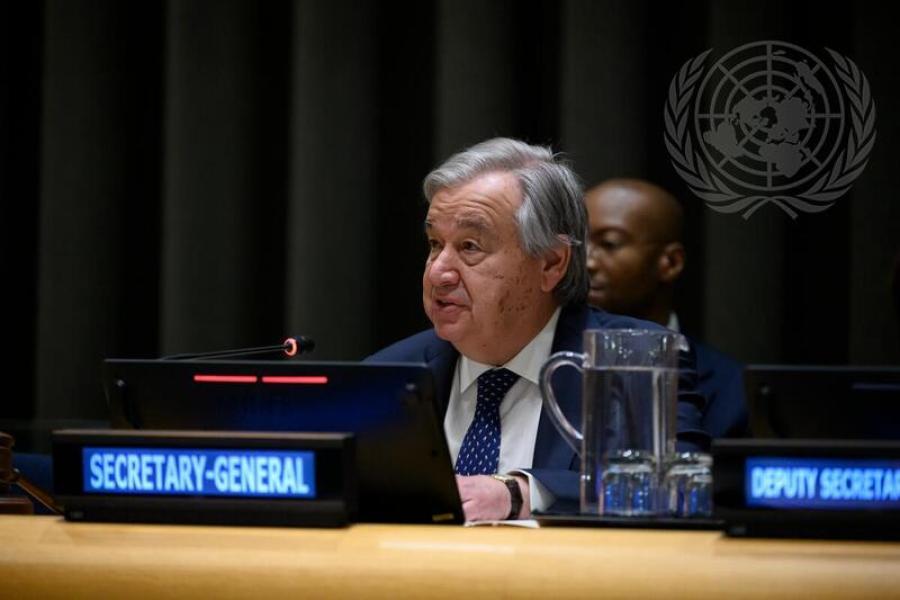World Climate Action Summit 2023 - 03 Dec 2023
03 December 2023

Following are UN Secretary-General António Guterres’ remarks to Early Warning for All Event on 3 December at Dubai, UAE:
Before I begin, allow me to say a quick word about the announcement yesterday from several members of the oil and gas industry as this is the first public occasion in which I can do it.
The fossil fuel industry – the giant behind the climate crisis -- is finally starting to wake up.
But the promises made clearly fall short of what is required.
The commitment on the elimination of methane by 2030 is a step in the right direction.
But the announcement to achieve net zero by 2050 says nothing about eliminating emissions from fossil fuel consumption – the so-called scope 3.
Science is clear: we need to phase out fossil fuels within a timeframe compatible with limiting global warming to 1.5 Celsius.
In addition, yesterday’s announcement provided no clarity on the pathway to reaching net zero by 2050 which is absolutely essential to ensure integrity.
There must be no room for greenwashing.
We are here today, together to keep raising the bar on ambition and ensuring justice.
In a world defined by escalating climate injustices, early warning systems are the most basic tool for saving lives and securing livelihoods.
Yet too few people in the developing world have access to them.
Half the world is still unprotected from natural hazards.
Countries that are vulnerable to extreme weather, especially Small Island Developing States and Least Developed Countries, and the entire African continent, should have the highest rates of protection. But they are well below the global average.
As the world continues to break all the wrong climate records, every moment of delay costs lives.
2023 will be the warmest year on record.
To meet the 1.5-degree limit of the Paris Agreement, greenhouse gas emissions must fall 45 per cent by 2030, compared to 2010 levels. But under national plans that are currently known they are set to increase by 9 per cent.
Delayed action means, quite simply, more deadly extreme weather events. More deaths. More destruction. And less ability to recover.
Those on the front line of the climate crisis will continue to pay the highest price.
We must both cut carbon pollution at an accelerated pace; and massively invest in protecting vulnerable people and communities from the impact of more frequent and severe climate-related events.
The Early Warnings for All initiative to provide protection from hazardous weather, water or climate events by the end of 2027 is a proven and effective way to save lives and protect vulnerable communities.
This is an ambitious goal – but it is achievable.
To make it a reality, we need all hands-on deck – collaborating and cooperating in a way that has not been done before.
I welcome the progress made over the past year. Greater coordination and collaboration among partners has achieved concrete results.
I commend the political commitment and leadership of many governments in the first cohort of countries to advance the initiative.
Maldives, Laos and Ethiopia now have dedicated national action plans and coordination structures in place.
Benin has strengthened communications to reach communities at greatest risk.
Fiji’s flash flood warning has been expanded to benefit nearly 1 million people.
And I am encouraged by progress on finance, including new bilateral contributions and alignment with existing investments.
All major multilateral development banks, the global climate funds and the key financing mechanisms have coalesced around the Early Warnings for All initiative.
These commitments are essential and invaluable.
All these developments bring us closer to making this ambitious goal a reality by 2027. But we still have a long way to go.
In a world that is on a fast-track to 3 degrees Celsius, and where adaptation needs are huge and growing, climate vulnerability is bound to escalate.
The estimated cost of this effort is just over $3 billion US dollars in total – a tiny fraction of the hundreds of billions made by the fossil fuel industry last year.
I again call for a windfall tax on these profits, and for the money to be used to protect those suffering the worst impacts of the climate crisis.
And I urge all countries to continue to be bold and ambitious and to double the speed and scale of support in 2024.
You can be assured of my continued commitment.
Many of you in this room are demonstrating exactly what I have envisioned for this initiative.
Thank you for your contributions and collaboration.
I thank Professor Talaas and Ms. Mizutori for their leadership, alongside the International Telecommunication Union, the International Federation of the Red Cross and Red Crescent Societies and other key partners.
And I look forward to another year of significant progress as we fast forward to meeting the goal of Early Warnings for All by 2027.
And I thank you.
[END]

















